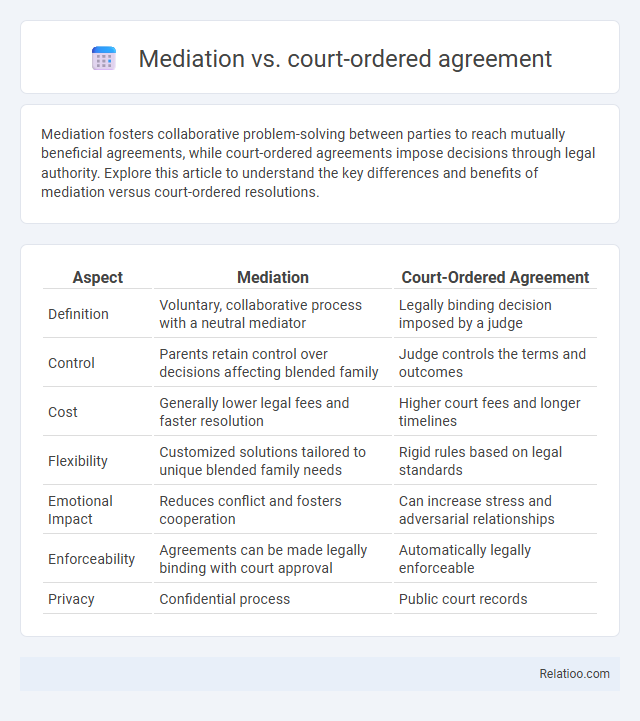Mediation fosters collaborative problem-solving between parties to reach mutually beneficial agreements, while court-ordered agreements impose decisions through legal authority. Explore this article to understand the key differences and benefits of mediation versus court-ordered resolutions.
Table of Comparison
| Aspect | Mediation | Court-Ordered Agreement |
|---|---|---|
| Definition | Voluntary, collaborative process with a neutral mediator | Legally binding decision imposed by a judge |
| Control | Parents retain control over decisions affecting blended family | Judge controls the terms and outcomes |
| Cost | Generally lower legal fees and faster resolution | Higher court fees and longer timelines |
| Flexibility | Customized solutions tailored to unique blended family needs | Rigid rules based on legal standards |
| Emotional Impact | Reduces conflict and fosters cooperation | Can increase stress and adversarial relationships |
| Enforceability | Agreements can be made legally binding with court approval | Automatically legally enforceable |
| Privacy | Confidential process | Public court records |
Introduction to Mediation and Court-Ordered Agreements
Mediation is a voluntary, confidential process where a neutral third party helps disputing parents reach a mutually acceptable agreement on custody, visitation, and support without going to court. Court-ordered agreements, by contrast, are legally binding arrangements imposed or approved by a judge after reviewing the facts and circumstances of the case, often following unsuccessful negotiations or mediation attempts. Parenting agreements can stem from either mediation or court orders but are more flexible when developed through mediation, allowing tailored solutions that prioritize the child's best interests.
Key Differences: Mediation vs Court-Ordered Agreements
Mediation involves a voluntary, confidential process where a neutral mediator helps you and the other party reach a mutually acceptable resolution, focusing on collaboration and personalized solutions. Court-ordered agreements are legally binding decisions imposed by a judge after a formal hearing, which may limit flexibility and require strict adherence to the court's terms. Unlike parenting agreements, which are typically consensual and privately arranged to address child custody and support, court orders enforce compliance through the legal system.
Advantages of Mediation
Mediation offers a flexible, confidential environment that encourages cooperative problem-solving, reducing the emotional and financial stress often associated with court-ordered agreements. Unlike court-ordered rulings, mediated agreements empower parents to create customized parenting plans tailored to their children's unique needs. This collaborative process generally leads to higher compliance rates and fosters healthier co-parenting relationships.
Benefits of Court-Ordered Agreements
Court-ordered agreements provide a legally binding resolution that ensures enforceability and compliance, offering you protection and clarity in custody, visitation, and support arrangements. These agreements reduce the risk of future disputes by having terms officially sanctioned by a judge, creating a stable framework for both parents and children. Unlike mediation or informal parenting agreements, court orders carry the weight of the judicial system, making modifications or enforcement possible through legal channels.
Cost Comparison: Mediation vs Court
Mediation typically costs significantly less than court-ordered agreements, with expenses often ranging from a few hundred to a few thousand dollars depending on the complexity and duration of sessions. Court-ordered agreements involve higher costs due to legal fees, filing fees, and potential attorney billing hours, sometimes running into several thousand dollars or more. Your choice can greatly impact overall expenses, making mediation a cost-effective alternative for resolving disputes efficiently without the prolonged costs of litigation.
Timeframe and Efficiency
Mediation typically offers a faster resolution, often concluding within a few sessions over weeks, promoting efficient communication and flexible scheduling. Court-ordered agreements can extend the timeframe significantly, sometimes taking months or longer due to legal processes and court availability. Parenting agreements created outside of court can be tailored efficiently by parents themselves, but may require additional legal review to ensure enforceability, impacting their overall timeframe.
Voluntary Participation vs Judicial Enforcement
Mediation relies on voluntary participation, where both parties work collaboratively to reach a mutually agreeable solution without court intervention. Court-ordered agreements are enforced by the judiciary, ensuring compliance through legal mandates and potential penalties for non-compliance. A parenting agreement, while often voluntarily crafted between parents to outline custody and care terms, may require judicial approval to become enforceable, blending voluntary intent with potential legal enforcement.
Confidentiality in Dispute Resolution
Mediation offers a confidential environment where parties can openly discuss issues without fear that their statements will be used in court, promoting honest communication and mutual resolution. Court-ordered agreements often become part of the public record, reducing the privacy of sensitive information shared during the dispute resolution process. Parenting agreements negotiated privately or through mediation typically maintain confidentiality, protecting the details concerning children's welfare from public disclosure and ensuring focused, trust-based arrangements.
Ideal Situations for Each Method
Mediation is ideal when both parties seek a collaborative and less adversarial approach to resolve disputes, especially in family law cases where preserving relationships is important. Court-ordered agreements are necessary when parties cannot reach a consensus and require a legally binding decision enforced by the judiciary, often in high-conflict or complex cases. Your best option is a parenting agreement when you want to establish clear, mutually agreed-upon terms for child custody and support without court intervention, ensuring flexibility and customized arrangements.
Choosing the Right Path for Your Dispute
Choosing the right path for your dispute involves understanding the differences between mediation, court-ordered agreements, and parenting agreements. Mediation offers a collaborative and less adversarial approach to resolving conflicts, while court-ordered agreements are legally binding decisions imposed by a judge after evaluation. Parenting agreements provide a personalized plan focusing on the child's best interests, often crafted with input from both parties to ensure a workable and amicable solution.

Infographic: Mediation vs court-ordered agreement
 relatioo.com
relatioo.com